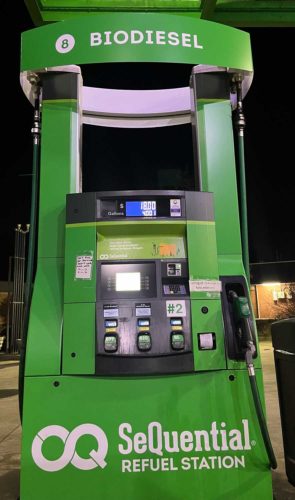
Since 2006, SeQuential Biofuels has been collecting used cooking oil from restaurants and community members and refining it into biodiesel in its plant in Salem. Diesel vehicle drivers in Eugene have been able to run that biofuel in their cars and trucks, thanks to the SeQuential station in town. That process is about to change.
On Jan. 13, Neste, a Finnish company that is the world’s largest producer of renewable diesel, acquired the used cooking oil collection business that’s a part of Crimson Renewable Energy Holdings, which includes SeQuential Environmental Services.
SeQuential co-owner Ian Hill says that the Eugene SeQuential retail station off McVay Highway will stay under his and his business partner Tyson Keever’s ownership and is not expected to make any big changes except for transitioning from biodiesel to renewable diesel sometime this spring.
Neste will no longer use the Salem plant to produce biodiesel and instead will ship the collected used cooking oil to a recently acquired plant in the Bay Area. Also, Neste says in a press release that it won’t be making biodiesel from used cooking oil, but producing renewable diesel instead. Neste plans to use the Salem plant as a cooking oil refinery.
Biodiesel (fatty acid methyl ester) and renewable (hydrotreated vegetable oil) diesel both can be made from cooking oil, but differ mainly in their refinery process. Hill says renewable diesel is interchangeable with petroleum diesel, making it more widely available for use in diesel engines since manufacturers will endorse it. In addition, its chemical properties make it more equipped to function in colder weather.
“The way I look at it is, we were going to a next-generation technology at a scale that allows us to make a lot more impact and have a lot more carbon reduction,” Keever says.
Keever says vehicles can use higher blends of renewable diesel year-round, meaning that per fill up there’s less petroleum diesel being used, which hopefully will translate to more renewable fuels being used overall. The Oregon Department of Environmental Quality says that “using renewable diesel can cut lifecycle greenhouse gas emissions up to 85 percent.”
However, the sale means that Oregon is losing one of its biggest biodiesel production plants, and Neste will be shipping used cooking oil down to California to refine and then shipping it back up to Oregon for consumers to use here.
Keever points out that before this sale, SeQuential was collecting used cooking oil from Washington, Oregon and California, and shipping it to Salem. “It’s better for the environment in the long haul because it’s a much larger scale,” Keever says. “Neste has huge growth ambitions to work on waste residue recycling.”
According to Neste, the refinery plant in Martinez, California, is expected to be able to make 730 million gallons of renewable fuel per year. Neste states in the press release that it currently produces 845 million gallons of renewable diesel and hopes to reach 1.8 billion gallons in 2023.
Keever confirmed that those biodiesel drivers who enjoyed the french fry smell of their fuel will still waft fried food fumes from the renewable diesel.